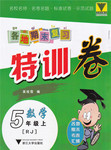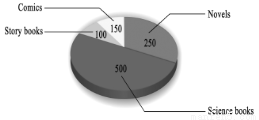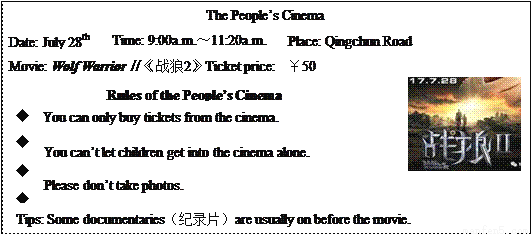
 ������ĩ��ϰ��ѵ��ϵ�д�
������ĩ��ϰ��ѵ��ϵ�д� С��ʿ��ĩ����100��ϵ�д�
С��ʿ��ĩ����100��ϵ�д�
| �꼶 | ���пγ� | �꼶 | ���пγ� |
| ��һ | ��һ��ѿγ��Ƽ��� | ��һ | ��һ��ѿγ��Ƽ��� |
| �߶� | �߶���ѿγ��Ƽ��� | ���� | ������ѿγ��Ƽ��� |
| ���� | ������ѿγ��Ƽ��� | ���� | ������ѿγ��Ƽ��� |
��Ŀ������Ӣ�� ��Դ��������2017��9�¾��� �������ר����ϰ ���ͣ��������
A group of adults, highly succeeded in their jobs, went to visit their old professor. Soon they began to ________ the stress in work and life.
The professor went to the kitchen and returned _______a pot of coffee and all kinds of cups ��crystal (ˮ��), glass, plastic; some nice looking, some simple looking; some ________, some cheap. And he told them to help _______to the coffee.
When all the students had a cup of coffee in hand, the professor said, ��I��ve noticed that all the nice looking expensive cups were ________, leaving behind the simple and cheap ones. While it is
_________ for you to take only the best for yourself, that is the root of your ________ and stress.
You know that the cup itself adds no quality (Ʒ��) to the coffee. ______ you really wanted was coffee, not the cup, _______ you went for the best cups without thinking.
Now consider this: Life is the coffee. The jobs, money and ______ in society are the cups. They are just ________ to hold life, and the type of cup doesn��t change the quality of our life. Sometimes, by ______ attention to the cup only, we fail to enjoy the coffee that God has ________ us. God offers us the coffee, not the cup. Please enjoy your coffee!��
The happiest people don��t have the best of everything. They just make ______ of everything. Live simply. Love generously. Care deeply. Speak _______. And leave the rest to the God.
1.A. think of B. thank for C. talk about D. drop by
2.A. for B. at C. in D. with
3.A. expensive B. ordinary C. strong D. serious
4.A. them B. themselves C. him D. everyone
5.A. mixed up B. got up C. taken up D. made up
6.A. normal B. important C. impossible D. necessary
7.A. thoughts B. failure C. questions D. problems
8.A. Who B. How much C. What D. That
9.A. and B. but C. so D. or
10.A. position B. age C. health D. purpose
11.A. cups B. tools C. bags D. bowls
12.A. putting B. getting C. turning D. paying
13.A. taught B. provided C. returned D. bought
14.A. fun B. use C. mess D. the worst
15.A. kindly B. sadly C. rudely D. seriously
 1.C
2.D
3.A
4.B
5.C
6.A
7.D
8.C
9.B
10.A
11.B
12.D
13.B
14.B
15.A
������������������һ���ɹ���ѧ��ȥ�ݷ�������ǰ�Ĵ�ѧ���ڣ�̸�������ݺܿ�������Թ�����������е�ѹ�����������ṩ�����Dz�ͬ���ӵĿ��ȵ�ʱ��ѧ����ȥ��עƯ���İ���ı��ӣ���...
1.C
2.D
3.A
4.B
5.C
6.A
7.D
8.C
9.B
10.A
11.B
12.D
13.B
14.B
15.A
������������������һ���ɹ���ѧ��ȥ�ݷ�������ǰ�Ĵ�ѧ���ڣ�̸�������ݺܿ�������Թ�����������е�ѹ�����������ṩ�����Dz�ͬ���ӵĿ��ȵ�ʱ��ѧ����ȥ��עƯ���İ���ı��ӣ���...�鿴�𰸺ͽ���>>
��Ŀ������Ӣ�� ��Դ��2018��ɽ��ʡ��Ӫ���п�Ӣ���Ծ� ���ͣ���ѡ��
We asked 1,000 students from Hope Middle School about what kind of books they love. Here are the results.

According to the pie chart above, of the students love science books.
A. ten percent B. fifteen per cent C. a quarter D. half
 D
��������
���⣺������ϣ����ѧ��1000��ѧ��ѯ������ϲ��ʲô�����顣���ǵ����������������Բ�ηָ�ͳ��ͼ����_________ѧ����ϲ����ѧ�鼮��A. ten percent�ٷ�֮ʮ��B. fifteen per cent�ٷ�֮ʮ�壻C. a quarter �ķ�֮һ��D. halfһ�롣ͨ���۲�ͼ����֪��science booksռ��500�ˣ�������1000�˵�һ�룬�ʴ�Ϊ...
D
��������
���⣺������ϣ����ѧ��1000��ѧ��ѯ������ϲ��ʲô�����顣���ǵ����������������Բ�ηָ�ͳ��ͼ����_________ѧ����ϲ����ѧ�鼮��A. ten percent�ٷ�֮ʮ��B. fifteen per cent�ٷ�֮ʮ�壻C. a quarter �ķ�֮һ��D. halfһ�롣ͨ���۲�ͼ����֪��science booksռ��500�ˣ�������1000�˵�һ�룬�ʴ�Ϊ...�鿴�𰸺ͽ���>>
��Ŀ������Ӣ�� ��Դ��2018��ɽ��ʡ��Ӫ���п�Ӣ���Ծ� ���ͣ���ѡ��
The 119 passengers are Liu Chuanjian. Without him, they would probably have lost their lives.
A. hard on B. thankful to C. friendly to D. responsible for
 B
��������
���⣺119λ�˿Ͷ���������ʾ��л�����û���������ǿ��ܻ�ʧȥ������be hard on�ϸ�Դ�[����]ij�ˣ�be thankful to�ԡ�����ʾ��л��be friendly to�ԡ�����ʾ�Ѻã�be responsible forΪ�������𡣽�Ͼ��⣬������������119λ�˿͵���������˳˿Ͷ�����ʾ��л����ΪB��
B
��������
���⣺119λ�˿Ͷ���������ʾ��л�����û���������ǿ��ܻ�ʧȥ������be hard on�ϸ�Դ�[����]ij�ˣ�be thankful to�ԡ�����ʾ��л��be friendly to�ԡ�����ʾ�Ѻã�be responsible forΪ�������𡣽�Ͼ��⣬������������119λ�˿͵���������˳˿Ͷ�����ʾ��л����ΪB���鿴�𰸺ͽ���>>
��Ŀ������Ӣ�� ��Դ������̩�˼ô���ѧ����Ӣ��˫������ҵţ��8��Units1 ���ͣ��Ķ���ѡ
When an animal helps another animal, it usually gets something valuable in return For a long time, many scientists thought that only people could act generously just because it felt good.
However, a new study in Germany suggests that chimpanzees (an animal like a large monkey without a tail ) also do good things for.no real reason And so do children who are as young as 18 months old. Maybe it is because humans and chimpanzees share an ancestor about 6 million years ago,
"People and chimpanzees appear to develop such features without any other
training," says Warneken, a scientist in Germany.
Warneken and his partners worked on adult chimpanzees that live on an island in
the African country of Uganda They also worked with 18-month-old children in Germany. The researchers performed three experiments on the adult chimpanzees and two experiments on the kids. In the first animal experiment, a person tried to reach his arm into a cage to get a stick, but he couldn't reach it. A chimpanzee was in the cage, and it could reach the stick if it wanted to.
Thirty-six chimpanzees took part in this experiment one by one, and no chimpanzee saw what the other chimpanzees had done. Even though the animals hadn't met the person before, they usually took the stick and gave it to the person What's more, they did this whether or not the person offered them bananas as a reward. In a similar experiment, 36 children acted in a similar way. They helped the person reach the stick, whether or not they were offered toys for their help.
Researchers did other experiments on chimpanzees and babies. No rewards were offered in either experiment. And still, both the chimpanzees and children went out of their way to help. Still, the new study is different from earlier findings. Researchers have found that chimpanzees don't give rewards of food to other chimpanzees, even if it costs them nothing to be generous.
1.A new study in Germany suggests that _ .
A. people also share information for good reasons
B. children know something at the age of 18 months
C. chimpanzees also do good things for no real reason
D. humans should develop their abilities 6 million years ago
2.Warneken and his partners worked with _ .
A. young chimpanzees that live on an island
B. 18-month-old children who live in Germany
C. kids who are living with adult chimpanzees
D. adult chimpanzees that live on the African mountain
3.Which of the following is NOT true according to the passage?
A. The animals hadn't met the person before the experiments.
B. No chimpanzee saw what the other chimpanzees had done.
C. The chimpanzees gave the person the stick in order to get a reward.
D. Thirty-six chimpanzees joined in this experiment one by one.
4.In a similar experiment, thirty-six children helped the person reach the stick
A. If they were offered toys for their work
B. when they were asked to give him a hand
C. after they were ordered to act in a similar way
D. whether they were given toys for their help or not
5.From the passage we know that _
A. children are more generous than chimpanzees m some ways
B. chimpanzees will reward good food to other chimpanzees
C. both chimpanzees and children can find their way to help others
D. both chimpanzees and children can do the difficult experiments
 1.C
2.B
3.C
4.D
5.C
��������
���´��⣺������Ҫͨ��һ��ʵ�飬˵���˴����ɺ�����һ���������Լ��ķ�ʽ�����İ������ˡ�
1.ϸ�������⡣����However, a new study in Germany suggests that chimpanzees (an animal like a large monkey without a ...
1.C
2.B
3.C
4.D
5.C
��������
���´��⣺������Ҫͨ��һ��ʵ�飬˵���˴����ɺ�����һ���������Լ��ķ�ʽ�����İ������ˡ�
1.ϸ�������⡣����However, a new study in Germany suggests that chimpanzees (an animal like a large monkey without a ...�鿴�𰸺ͽ���>>
��Ŀ������Ӣ�� ��Դ���㽭ʡ����2017-2018ѧ�����꼶��һѧ����ĩ����Ӣ���Ծ� ���ͣ��Ķ���ѡ

1.People can see the movie on .
A. July 18th B. July 28th C. June 18th D. June 28th
2.When does the movie Wolf Warrior�� begin?
A. At 9:30 a.m. B. At 9:30 p.m. C. At 9:00 a.m. D. At 11:20 a.m.
3.Jim wants to see the movie with his friends Lily and Lucy. How much should they spend on the tickets?
A. ��25. B. ��50 C. ��100. D. ��150.
 1.B
2.C
3.D
��������
����Ϊ��Ӱ�������ں���������ˡ�ս��2������ӳ���ڡ���ӳʱ���Ʊ�ۡ��Լ�Ҫ��
1.ϸ�������⡣���ݱ������ݣ�������7��28�ſ�֪��������7��28�ſ��Կ���ս��2���ⲿ��Ӱ����ѡB��
2.ϸ�������⡣�ɲ��ŵ�ʱ��9:00a.m.��11:20a.m. ��֪�� ��ս��2�� ���ŵ�ʱ��Ϊ�����9:00����ѡC��
3.���ּ����⡣...
1.B
2.C
3.D
��������
����Ϊ��Ӱ�������ں���������ˡ�ս��2������ӳ���ڡ���ӳʱ���Ʊ�ۡ��Լ�Ҫ��
1.ϸ�������⡣���ݱ������ݣ�������7��28�ſ�֪��������7��28�ſ��Կ���ս��2���ⲿ��Ӱ����ѡB��
2.ϸ�������⡣�ɲ��ŵ�ʱ��9:00a.m.��11:20a.m. ��֪�� ��ս��2�� ���ŵ�ʱ��Ϊ�����9:00����ѡC��
3.���ּ����⡣...�鿴�𰸺ͽ���>>
����ʡ������Υ���Ͳ�����Ϣ�ٱ�ƽ̨ | �����к���Ϣ�ٱ�ר�� | ����թƭ�ٱ�ר�� | ����ʷ���������к���Ϣ�ٱ�ר�� | ������Ȩ�ٱ�ר��
Υ���Ͳ�����Ϣ�ٱ��绰��027-86699610 �ٱ����䣺58377363@163.com